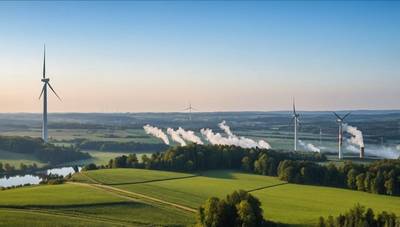Germany reduces plans for new gas-powered generation as part of the decarbonisation compromise
Germany has reduced the amount of gas fired power capacity that it plans to develop, to about 10 gigawatts. This is half of what was planned at the beginning of the year. The goal is to strike a balanced between decarbonisation, and supporting intermittent renewables.
Friedrich Merz, the conservative Chancellor and his Social Democrat coalition partner reached a decision late Thursday night. It was a compromise that sought to satisfy both those who wanted a faster energy transition and others who were concerned about industry's ability to function without reliable supplies of low-cost energy.
Merz said that "the tenders will specify the technical capability of the new power plants to be fired by hydrogen."
It is intended to appease critics who claim that gas power locks Germany in to producing greenhouse gases, rather than combating climate change.
Merz stated that the European Commission has indicated it will accept the new plans. These include a commitment of building a further 2 gigawatts using any technology, including batteries.
Energy companies will not be interested in capacity that is only used intermittently, so they'll need subsidies - which could amount to billions of Euros.
Next year, tenders for eight gigawatts of new power will be released. The new capacity is expected to come online in 2031.
By 2045, the tender requires that new power plants be carbon neutral. This can be achieved either by sequestering carbon dioxide or by reducing the amount of electricity they produce.
In 2026 and 2027, two additional gigawatts will be offered for sale. These units, initially powered by gas, must be quickly converted to hydrogen fuel. A second technology-neutral bid is scheduled for 2029. (Reporting and editing by Mark Potter, Thomas Escritt)
(source: Reuters)

